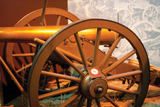Civil War anniversary important to state


Erin Peden/Pioneer
A civil war cannon on display at the Oklahoma History Center located at 800 Nazih Zuhdi in Oklahoma City, near the state capitol. The Oklahoma History Center is open 10 a.m. to 5 p.m. Monday through Saturday.
“This battle and this war was literally brother against brother.”
Ralph Jones, former superintendent of the Honey Springs battlefield historic site, located in Checotah, Okla., was speaking of the Civil War, where fathers, sons and brothers found themselves fighting against each other in a war that divided the U.S.
He said the brutality of that statement resonates to this day.
With 2011 marking the 150th anniversary of the Civil War, the nation is revisiting the path that its citizens have forged since then and the pivotal influence it still holds.
The Civil War led to the emancipation proclamation, and had great influence on the industrial revolution — Oklahoma specifically, Jones said.
“The Civil War is especially important to the history of Oklahoma because of certain aspects of politics that led to the formation of the state we have today,” he said.
“Honey Spring is the largest of 107 documented hostile encounters between North and South in the Indian Territory,” Jones said.
“As a result of this battle the confederates no longer had free reign and roaming rights on the Arkansas River.”
“The Battle of Honey Springs was significant to the war in that among the federal units there were the First Kansas Colored infantry — that’s what they were called at the time,” Jones said.
“They were the first black regiment organized in the federal army during the war.”
The battle of Honey Springs was the inspiration for one of OCCC’s murals in the courtyard.
Mary Ann Moore, Visual Arts professor, spearheaded the mural project and called on her students to help.
“We were looking for different things in history or things that happened that were important and really made a difference on our society today — particularly because of the people who fought,” Moore said.
“There was not just free black men but American Indians.”
For more information, visit www.civilwar.org or contact the Oklahoma History Center at 405-522-0765.
To contact Priscilla Colley, email staffwriter2@occc.edu.